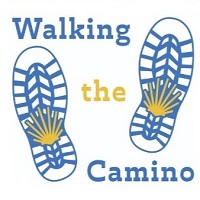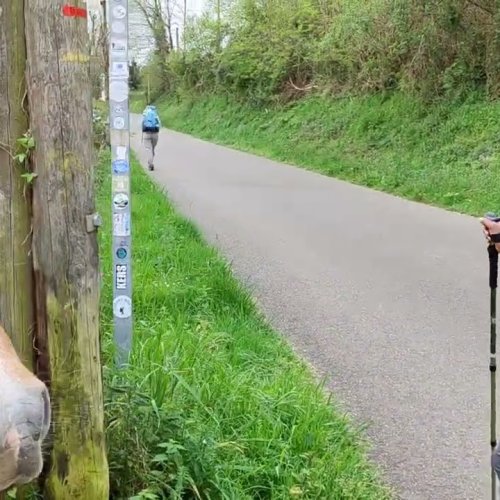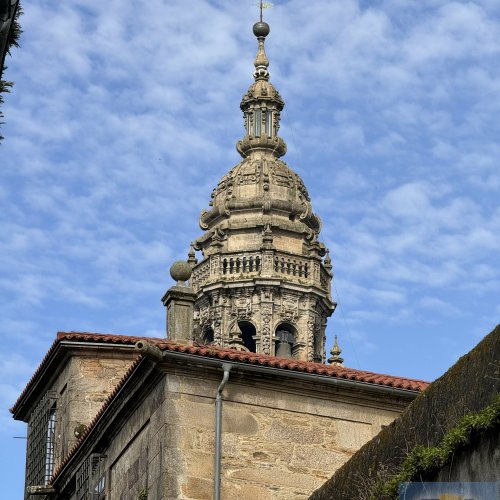Mods and longtime regular forum members have surely noticed the way some common words are frequently misspelled. Though it’s not a big deal, it does mess with the search function. If you look for trains going to Pondeferra or Bilboa, you’re not going to find any!
This thread is intended to be a lighthearted (but maybe school-marmish ) effort to clean up some of our most frequent faux pas. I’ll start.
ALBERGUE, not albUrgue, not albUrgE, not albUErgue, not albergE, not aUbergue, not alberQue.
Auberge is the correct spelling in French, so I won’t count that as a misspelling.

What are your favorites?
For as long as my post might last, here is another peeve, more about grammar than spelling.
I first became aware of the flying apostrophe in the late 60s of the last century. I left my native land and landed in a nearby jurisdiction where soup's, tea's and sandwiche's were advertised with (what was then innocent) gay abandon.
In the early years of the current century, I read a book, translated from Euskerra to Castellano, and the theme was the escape of the printed letter to the wide world. Suddenly, printed letters flew off pages into the wide world beyond...
I apologise for forgetting title or conclusion, my grasp of Castellano was in a burgeoning state!

Reading my online newspaper this morning, I feel inclined to share a commentary...

An Irishwoman’s Diary
THE APOSTROPHE PROTECTION SOCIETY HAS RISEN FROM THE ASHES, STRONGER THAN EVER. PHOTOGRAPH: GETTY IMAGES
When it feels like the world is hurtling towards hell in a handcart, it’s important to seize upon any small glimmer of hope. If you involuntarily shudder when “its” and “it’s” are used incorrectly, then the Lazarus-like recovery of the Apostrophe Protection Society might offer a sliver of optimism.
Back in 2019, John Richards threw his hands in the air and announced that he was shutting down the UK-based punctuation appreciation group society. He blamed ignorance and laziness for bringing his society to a full stop.
Careless punctuators would now be free to roam the streets, sprinkling unnecessary apostrophes over signs as though they were an optional extra. Councils would shamelessly erect signs warning people to “expect delay’s” and never worry that they might be brought to account for their crimes against the English language. Our children would grow up in a world with so many apple’s and orange’s for sale that they would never know the joy of seeing a correctly-applied apostrophe.
Or so we thought, for the Apostrophe Protection Society has risen from the ashes, stronger than ever. Punctuation warrior Bob McCalden opened a new chapter last year and the rejuvenated society has already amassed more than 2,000 members. After he spoke on RTÉ Radio 1 in September about his battle with Marks & Spencer to correct the line “perfect on it’s own” from its soda water label, he saw a surge in membership from Irish people.
When I checked in with him, he was celebrating the fact that the store had capitulated and removed the rogue apostrophe. As he noted wisely, it was not just an unwanted apostrophe, it was an M&S unwanted apostrophe. It’s good to know that it is possible to care about apostrophes and still find time to make a joke.
But the most passionate punctuation protectors in this land will know that there is also a homegrown group proselytising on abhorrent apostrophisers and miscreant misspellers. The Irish Apostrophe Protection Society was set up by Pádraig Ó Méalóid in 2010 to highlight the distressing abuse of the apostrophe. When Pádraig set up the Facebook page, he was also hoping to rid the world of writing that didn’t know the difference between “there”, “they’re” and “their”. And don’t get him started on “you’re” and “your”.
Thirteen years later, the page has amassed more than 5,400 members and they are an active bunch, on high alert for apostrophe abuse and general carelessness. One recent post highlighted a sign for “pumkings” in a supermarket while another produced a catalogue of misdemeanours on a children’s menu that offered “pizza’s and pasta’s” with a large portion of grammatical errors on the side. And an eagle-eyed crossword enthusiast highlighted an error in this very publication. A crossword clue had looked for a French desert wine, which led to a few quips about the wine being very dry. You have to hand it to them; these grammarians are a jocular bunch.
But there is no evidence that they have taken their fight to the streets, like the Bristol grammar vigilante who was the subject of a BBC Radio 4 documentary in 2017. It told how the unnamed engineer roamed the streets at night, correcting poor punctuation on shop fronts. Twenty years ago, he tackled his first sign, a council sign with a host of “ridiculous apostrophes” that he scratched off. Then he was affronted by a sign for “Amys Nail’s” and went on the offensive again.
As his work expanded, he customised a stepladder and invented an apostrophiser – an eight-foot-long device that allows him to plant a sticky-back plastic apostrophe in hard-to-reach areas. Asked if he was committing criminal damage, he said it was more of a crime to display an errant apostrophe.
If you feel that there are more serious things to worry about, such as the rise of fascism and the far-right, then you might appreciate the work of an Italian vigilante. Although he has eased up on his work in recent years, Cibo definitely left his mark on Verona.
The street artist had grown so despondent at the proliferation of Nazi graffiti around the city that he started painting more pleasant things over the swastikas and ugly messages. Being Italian, he chose food, of course. So caprese salads, luscious strawberries, pasta and cupcakes took the place of the hate-filled symbols. And when the neo-Nazi supporters came back to deface his art, it only inspired him to add more detail to the mural.
He has covered something bad with something good in a language everyone understands. Making the world better, one glorious wedge of cheese at a time. And who could argue with that?
Mods and longtime regular forum members have surely noticed the way some common words are frequently misspelled. Though it’s not a big deal, it does mess with the search function. If you look for trains going to Pondeferra or Bilboa, you’re not going to find any!
This thread is intended to be a lighthearted (but maybe school-marmish ) effort to clean up some of our most frequent faux pas. I’ll start.
ALBERGUE, not albUrgue, not albUrgE, not albUErgue, not albergE, not aUbergue, not alberQue.
Auberge is the correct spelling in French, so I won’t count that as a misspelling.

What are your favorites?

































